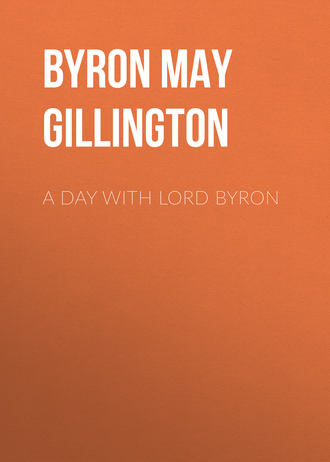
Byron May Clarissa Gillington
A Day with Lord Byron
And although, it will be noticed, he exempts the sea – and although the blood of old sea-kings, running fiercely in his veins, still kindles him to imperishable rapture in its presence, —
And I have loved thee, Ocean! and my joy
Of youthful sports was on thy breast to be
Borne, like thy bubbles, onward: from a boy
I wanton'd with thy breakers – they to me
Were a delight; and if the freshening sea
Made them a terror – 'twas a pleasing fear,
For I was as it were a child of thee,
And trusted to thy billows far and near,
And laid my hand upon thy mane – as I do here.
(Childe Harold.)
– yet there is sorrow on the sea itself, – the "unplumb'd, salt, estranging sea" which separates him from his mother-country. Cosmopolitan as he is, self-banished exile, quick with Greek and Italian sympathies, Byron never for one moment forgets that he is head of one of England's proudest families. Despite his scathing scorn towards his fair-weather London friends, towards the unreasoning outbursts of malignity which drove him out of his England – with all her faults, he loves her still. He vaguely hopes and hankers after a return to those long-lost shores: and endeavours to believe that the future will in some way make atonement for all the calamities of the past.
But now Shelley, Williams, Medwin, and Taafe are dismounting in the pine forest, and the men-servants setting up the target. Pistol-practice is Byron's forte; when he hits a half-crown at twelve yards he is as delighted as a boy, and quite glum and disconcerted if he should happen to miss. This very rarely happens, as he is a crack shot, easily distancing the other competitors. His hand trembles violently, but he calculates on this vibration, and, depending entirely on his eye, hardly ever fails. After about an hour's shooting, the light begins to wane towards sunset: and the friends ride back to the city, Byron in exuberant good humour with himself and everybody else. Arrived at the Palazzo Lanfranchi, he finds two guests awaiting him, – Count Pietro Gamba, brother of the lovely Contessa Guiccioli, and Trelawny, that handsome, picturesque, piratical-looking "Younger Son," who has not yet published to an astonished world his remarkable and almost incredible "Adventures." Trelawny is at present in command of Byron's yacht the Bolivar, lying in the harbour of Genoa.
The poet welcomes these new additions to his company: for, since his arrival in Pisa, he has begun to entertain men at dinner-parties, for the first time since leaving England. A very cheerful company sits down with him to dinner: their host displays himself to great advantage, "being at once," to quote Shelley, "polite and cordial, full of social hilarity and the most perfect good humour, never diverging into ungraceful merriment, and yet keeping up the spirit of liveliness throughout the evening." Byron, according to his own declaration, has never passed two hours in mixed society without wishing himself out of it again. Nobody, however, could guess at this fact from his bright, frank, and spontaneous gaiety. Always an abstemious eater – "I have fed at times for over two months together," he assures his friends, "on sheer biscuit and water," – very little food suffices him: and besides, bien entendu, he is anxious to retain that "happy slenderness" on which he prides himself, – the slenderness which is a characteristic of his family, and which he has recently endangered by a lazy life in Venice. The guests sit fascinated by his enthralling personality: they recognize that he wears a natural greatness which "his errors can only half obscure: " and they rivet their gaze upon that pale and splendid face, the only one, as Scott says, that ever came up to an artist's notion of what the lineaments of a poet should be. He looks around him upon the ethereal and feminine countenance of Shelley, the visionary, – the kind, pleasant, honest English faces of Medwin and Williams, – the good-looking Italian Gamba, the quaint little Irishman Taafe, – last, not least, the dark mustachios and wildly-flashing Celtic eyes of the Cornish adventurer Trelawny. This latter might well have served for a model of Conrad the Corsair: and so he is assured by his companions.
"Sun-burnt his cheek, his forehead high and pale
The sable curls in wild profusion veil…
His features' deepening lines and varying hue
At times attracted, yet perplex'd the view."
CONRAD AND GULNARE
"Extreme in love or hate, in good or ill,
The worst of crimes had left her woman still!
This Conrad mark'd, and felt – ah! could he less? —
Hate of that deed, but grief for her distress."
(The Corsair.)
But where, they ask, shall the original of Gulnare be found, – Gulnare, who stains her hand with the blood of her lord the Pasha, to save the Corsair from a dreadful death? Byron refuses to reveal his source of inspiration: but Shelley quotes with sincere approval the lines which most emphatically delineate that lovely, desperate woman.
Embark'd, the sail unfurl'd, the light breeze blew —
How much had Conrad's memory to review!..
He thought on her afar, his lovely bride:
He turned and saw – Gulnare, the homicide!


